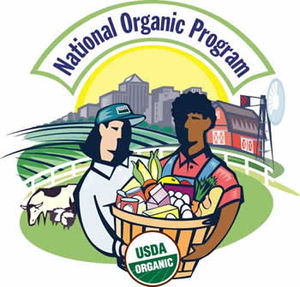 Image via Wikipedia
Image via Wikipedia
You may find just about everything from eggs, chicken and beef to various seasonal veggies that are organic, and even main staples such as cereals, pastas and soups that have been made with organic products. Nowadays most grocery stores have organic sections in them that make finding these products easier.
Organic food that is processed usually contains only organic ingredients. If any non-organic ingredients are present, a certain percentage of the food's total plant and animal ingredients must be organic. Any non-organically produced ingredients are subject to various agricultural requirements. Foods that claim to be organic must be free of artificial food additives, and are often processed with fewer artificial methods, materials and conditions, such as chemical ripening, irradiation and genetically modified ingredients.
Some studies have shown higher nutrient levels in organic fruit and vegetables compared with conventionally grown products. Studies have also shown that organic fruit and vegetables contain up to 40% more antioxidants than conventional equivalents.
I have found in my experience with buying organics that some of the items I purchase may be slightly higher in price. This may be due to the fact that organic produce is produced on a smaller scale, and may need to be milled or processed separately. Furthermore, there is an increase in shipping costs from more centralized production in otherwise regional markets.
Overall I find that the quality and taste of the food I buy that is organic is better than its conventional counterparts. I also feel a lot better about putting higher quality food into my body. Not everything I purchase is organic but I try to make it a factor in the decision of if I buy a product or not.
Hopefully this has helped. Check back for upcoming recipe ideas. Thanks!
![Reblog this post [with Zemanta]](http://img.zemanta.com/reblog_e.png?x-id=c64d0d78-49e3-4002-8678-772e3dc3241b)




Organic food tastes better too!
ReplyDelete